Understanding the Connection Between PMS and Insomnia
Cramps, bloating, irritability, and intense cravings. These are all common symptoms associated with your dreaded monthly “friend”. Before your menstrual cycle officially starts, you may experience some unpleasant symptoms known as PMS (premenstrual symptoms). These vary from one woman to the next, with some only experiencing mild symptoms while others are quite literally miserable for several days before their period arrives. In some more serious cases, women develop PMDD (premenstrual dysphoric disorder).

Nearly 75% of women experience mild PMS while only about 8% of women struggle with PMDD. Whichever category you fall into, you may have noticed another troubling and frustrating side effect of getting your period — insomnia. Approximately 30% of adults experience short-term insomnia, while another 10% suffer regularly. Unfortunately, women are more at risk of developing insomnia and disrupted sleep patterns — especially during, and leading up to, their menstrual cycle.
Why is this and what can you do about it? Here we’ll explore the connection between PMS and insomnia, as well as tips for improving your sleep patterns and preparing for this unpleasant shift in hormones.
Content
Your Menstrual Cycle Explained
To understand the connection between PMS and insomnia, you must first understand exactly what occurs during your menstrual cycle and how it affects your body.
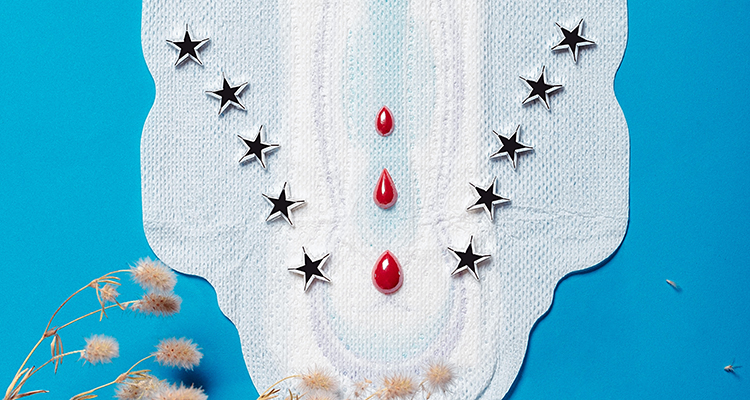
Most women get their period every 28 days. Menstrual cycles usually last between 3 and 7 days, with some women experiencing heavier blood flow than others. Your period is triggered by a change in hormones. When your ovaries release estrogen and progesterone, the lining of your uterus begins to thicken in preparation for pregnancy.
But these hormones do more than just change the physical make-up of your womb. They also cause a fluctuation in hormones. You’ll experience different emotions and physical changes during each stage of your menstrual cycle.
Menstrual Cycle Stages
Different changes occur in your body as it moves through menstrual cycles. Some symptoms are milder than others and some (lucky) women don’t experience noticeable side effects at all.
The 3 phases of the menstrual cycle are: follicular (before the egg releases), ovulatory (the egg releases), luteal (the time after the egg releases).
Follicular
During this phase, the egg cell develops inside your ovaries. It starts on the first day of your period and lasts for 14 days.
Because this phase overlaps your actual period, some experts consider the follicular phase a part of your menstrual cycle. It’s during your menstrual cycle that your body sheds its uterus lining in the form of blood and tissue. This phase also begins the first day you start bleeding and ends once the lining is fully shed (usually 3 to 7 days later).
Ovulatory
This is when ovulation begins. During this time, a mature egg is released. With most menstrual cycles lasting 28 days, this part of the process usually occurs on day 14.
Luteal
This phase occurs after ovulation and lasts for approximately 14 days. If the mature egg is not fertilized, the luteal phase will end when the next menstrual cycle begins.
Different hormones are released during different phases of the menstrual cycle. For example, estrogen and progesterone increase after ovulation and during the follicular phase. Near the end of the luteal phase, the presence of these hormones decreases significantly. It’s this fluctuation in hormones that can cause major emotional and physical changes — including disrupted sleep.
Understanding PMS
Now that you have a better handle on exactly what occurs inside your body during each phase of your menstrual cycle, let’s take a closer look at what exactly PMS is and how it affects you both physically and emotionally.
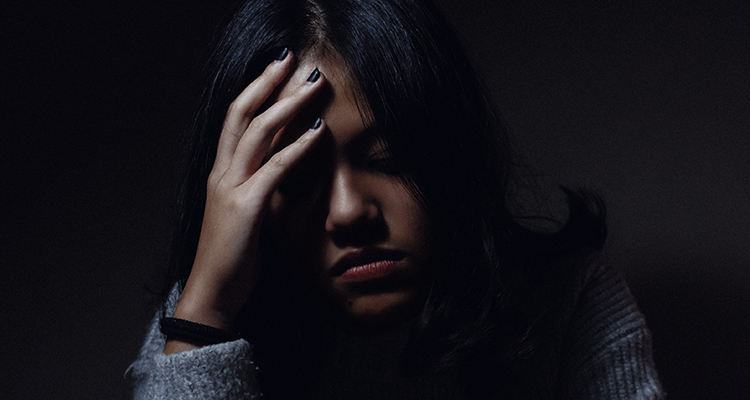
Premenstrual symptoms (PMS) can start as early as 10 days before your period arrives. Symptoms vary significantly from one woman to the next and can include, but aren’t limited to:
- Bloating and cramps
- Tender, swollen, or sensitive breasts
- Diarrhea or constipation
- Nausea and headaches
- Fatigue
- Confusion or lack of focus
- Mood swings and irritability
- Anxiety, sadness, or depression
- Decreased sex drive
- Changes in appetite
While these symptoms dissipate for most women once their menstrual cycle begins, some women experience them throughout their periods and even several days after. These symptoms are considered PMS. As previously mentioned, PMDD is a more serious condition where symptoms impact a person’s daily life, including work, school, and relationships. Those with PMDD usually experience five or more of the above-mentioned symptoms and their effects are much more severe.
It’s interesting to note that PMS and PMDD are more common in women in their 20s, 30s, and 40s. Younger girls generally have very mild symptoms. The most severe PMS symptoms are reported in women during their late 30s and early 40s. Women over the age of 50 are slowly moving away from PMS and into menopause.
There’s no clear-cut answer as to why some women experience worse PMS than others or even what causes these symptoms to occur. A fluctuation in hormones causes major changes in the female body as it prepares for pregnancy and again as it expels the uterus lining when eggs are not fertilized.
One theory is that chemical imbalances trigger changes in the brain and nervous system. The interaction between other hormone-regulatory systems like the metabolic system and the hormones released during PMS is another potential cause. Vitamin and nutritional deficiencies can also make matters (and symptoms) worse.
While no one knows exactly what causes PMS or PMDD or why these side-effects are worse in some women than others, they can impact your life significantly. It’s also no surprise that with all of these changes occurring inside your body over the course of 28 days that your sleep patterns may be disrupted or compromised.
The Difference Between Insomnia and Trouble Sleeping
Before we get into exactly how PMS can disrupt your sleep, it’s important to note that regular insomnia and insomnia triggered by PMS are two separate things.
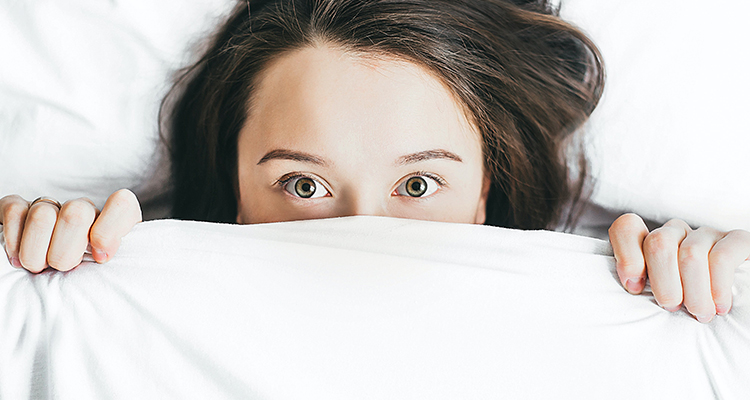
Millions of people suffer from insomnia in varying degrees, from mild, short-term symptoms to a lifelong struggle. The latter is usually associated with mental health illnesses including things like depression, bipolar disorder, and schizophrenia. Insomnia is a term that many people use to describe an inability to fall and stay asleep, but only a small percentage of people consistently struggle with this condition.
Insomnia triggered by PMS usually occurs as a result of changes in hormones during this time and physical discomfort. Women are twice as likely to experience sleep disruptions both before and during their period.
Now, let’s take a closer look at how the physical and emotional side-effects of PMS may trigger insomnia symptoms in some women.
Physical Effects of PMS on Sleep
Countless physical changes occur during PMS that change your body chemistry and can, in turn, affect your sleep patterns and your ability to fall and stay asleep.
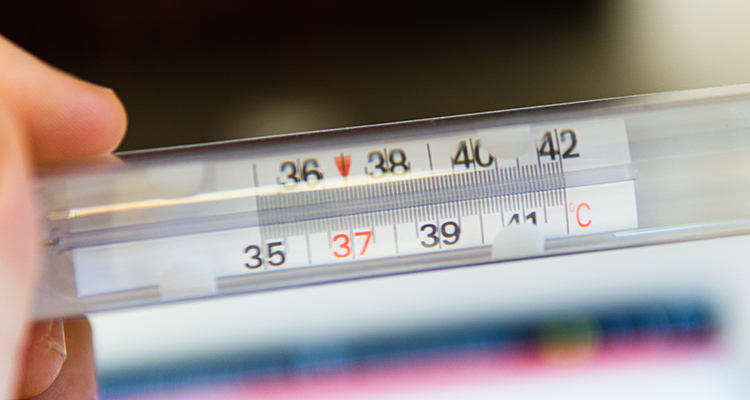
Body Temperature
As progesterone levels rise, so does your body temperature. High body temps can interfere with your REM cycle which usually occurs about 90 minutes after you fall asleep. The first part of this cycle lasts about 10 minutes. Each stage progressively gets longer, with the final period lasting up to 60 minutes. It’s during this time that your body processes information and forms dreams.
Your body temperature lowers during the REM cycle. If your temperature is elevated due to PMS, you won’t achieve this same state of deep, restorative sleep. This can cause mood swings and irritability associated with PMS.
Insufficient Progesterone Levels
High progesterone levels aren’t the only problem. Low levels can also interrupt your sleep patterns during PMS. Progesterone, in healthy amounts, helps make you tired. Dips in these levels can make it difficult to fall asleep or cause a restless night’s sleep.
When progesterone levels drop, so do serotonin levels. Serotonin is a chemical associated with not only happiness but relaxation and calm. It may also trigger cravings for foods high in sugar, carbohydrates, and fat. Consuming these foods before bed can interrupt your sleep and add to the discomfort you’re already experiencing due to PMS.
Melatonin Production
PMS may also impact your body’s natural production of melatonin. This much-needed chemical helps prepare your body for sleep. Without it, you might find yourself feeling restless, wired, or irritable at night.
Melatonin is also necessary for regulating your body’s circadian rhythm and healthy sleep patterns. A circadian rhythm regulates your body’s sleep-wake cycle, helping you fall asleep at night and wake in the morning feeling rested and energized.
Disrupted Sleep Architecture
This is a developing theory on the effects of PMS on sleep. Some studies show that during certain phases of the menstrual cycle a woman’s sleep architecture is altered. Sleep architecture is the natural structure of sleep patterns, meaning the order in which your brain and body enter different periods and depths of sleep including REM and NREM.
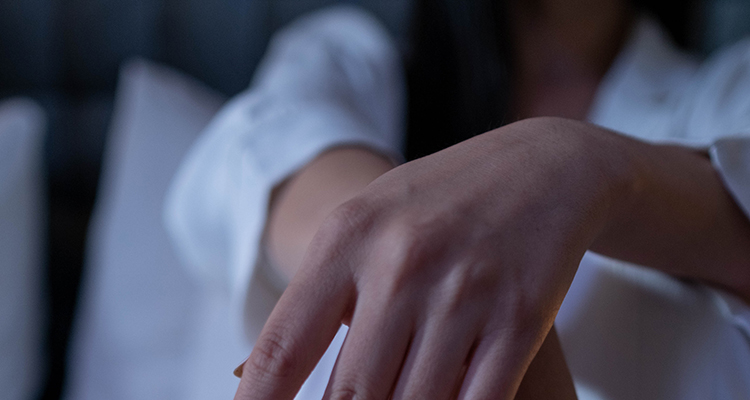
Cramps and Bloating
Chronic pain affects over 20% of adults. While the pain symptoms associated with PMS aren’t chronic, they can cause extreme discomfort. Menstrual cramps, tender breasts, headaches, and muscle aches can make it difficult to get comfortable at night and fall and stay asleep.
Even if you finally find relief or find a comfortable position, persistent pain can wake you and make it difficult to fall back asleep. Heating pads, ice packs, and over-the-counter pain medications can ease pain caused by PMS.
Low Iron Levels
Iron is an essential nutrient for proper body function and helps carry healthy levels of oxygen to your organs. Although low iron levels can sometimes cause fatigue, they can also interrupt healthy sleep patterns.
Iron helps regulate your body’s serotonin levels. A serotonin imbalance can leave you feeling anxious and moody.
Heavy Periods
Some women experience heavy blood flow during one or several days of their menstrual cycle. Blot clots and persistent bleeding can disrupt sleep. Nearly 15% of women report having heavy periods — heavy enough to require them to change their pad or tampon in the middle of the night.
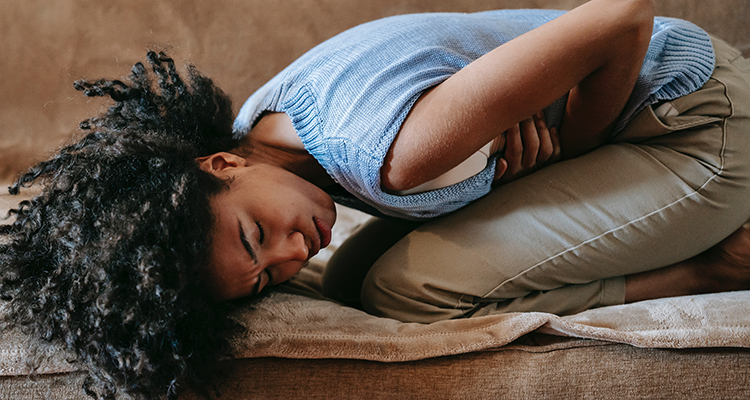
Food Cravings
While some people think food cravings during PMS are a myth (or an excuse for women to eat unhealthy foods), there is some science behind this claim. It’s the same dip in serotonin levels mentioned earlier that causes women to crave carbohydrates during PMS.
Carbohydrates can actually help increase serotonin levels, which is why your body urges you to consume them when levels are low. Foods high in sugar may also have a positive impact on mood swings and fatigue — two common side-effects of PMS.
The problem is, consuming any of these foods too close to bedtime can cause disrupted or troubled sleep. Avoid foods high in sugar or those that contain caffeine. Eating a meal that’s too heavy or rich before bed can also cause stomach upset. Your body is now working to digest this oversized meal instead of focusing on the task at hand — much-needed rest.
As your metabolism revs up to digest these foods, it also increases your body temperature. This spike can interfere with your body’s melatonin supplies and also make you hot and uncomfortable for sleep.
Emotional Effects of PMS on Sleep
In addition to the physical changes that accompany PMS, women undergo countless emotional changes as their hormones change and fluctuate. These emotional side-effects can significantly impact sleep.
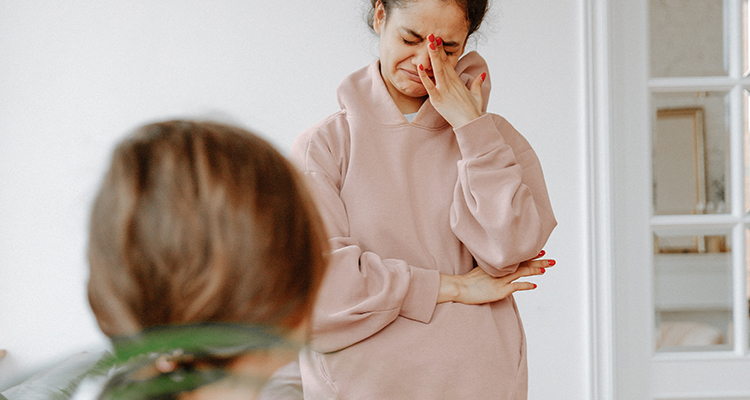
Increased Anxiety and Depression
It’s no surprise that the fluctuation of hormones associated with PMS can cause a wide range of unpleasant emotions from sadness and depression to anxiety. Once again, low levels of serotonin are partially to blame.
Serotonin is a powerful chemical in our bodies that helps regulate our moods and emotions. Low levels can cause a dip in happiness and more intense feelings of sadness. This is often the cause of unexplained crying episodes or increased sensitivity during PMS. While depression, in some people, can cause fatigue, it can cause others to lay awake at night, overthinking and analyzing the day’s events and interactions.
Anxiety is another common emotion during PMS and one that can trigger insomnia. Dopamine is a neurotransmitter that not only controls feelings of happiness and relaxation but often sees a drop in production during PMS. As mentioned before, anxiety over heavy blood flow or pain associated with your period can cause feelings of anxiety and even paranoia in some women.
Stress and Irritability
Your mind is a powerful tool and sometimes, it can work against you. The stress and irritability associated with PMS can actually make you think it’s harder to fall asleep than normal, triggering insomnia. You may even wake up feeling less well-rested, when in fact, you slept fine.
This conflict of emotions can cause mood swings, irritability, and increased stress. Being in pain or feeling sick is also a stressful occurrence. Intense cramps and discomfort caused by PMS can create feelings of unrest and irritability, making it difficult to relax your mind and body enough for sleep.
How to Achieve Better Sleep While Battling PMS
While all of these symptoms and hormonal changes may seem overwhelming and daunting, there is a light at the end of the tunnel! With the right mind frame, resources, and tools, you can achieve quality sleep despite the changes caused by PMS.
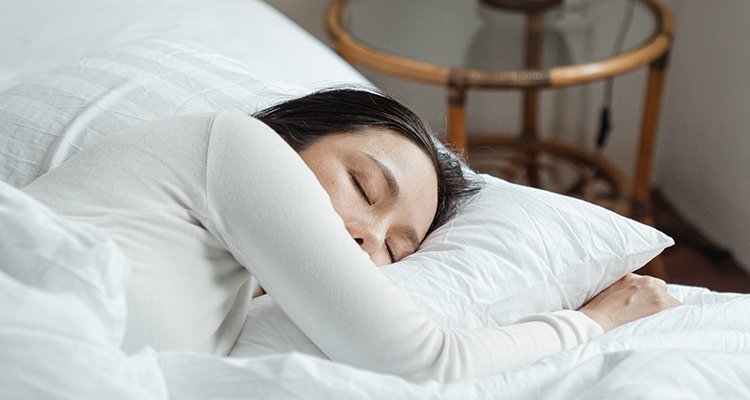
Here’s how!
Naturally Boost Serotonin Levels
As you’ve probably discovered, serotonin plays a major role in not only your mood and health but also your sleep patterns. Low levels of this neurotransmitter can leave you feeling sad, anxious, and downright exhausted!
The good news is, there are some simple and natural ways to boost serotonin levels in preparation for your period. Eating foods like bananas, eggs, and pineapple can actually boost serotonin levels, keeping those negative mood swings at bay. Satisfy your sugar cravings with healthier alternatives like mangoes, raisins, and berries. Serotonin also helps your body produce melatonin, so the more you ingest, the better you’ll feel and the better you’ll sleep.
Exercise is also proven to boost serotonin levels, in addition to natural sunlight. So, kill two birds with one stone by stepping outside for a nice, refreshing walk, hike, or bike ride.
Create a Sleep Sanctuary
All too often we not only bring our work and stress home with us but to bed! Do you read and answer emails, organize your calendar, or pay bills while laying in bed? While this may sound like multitasking, it’s actually interfering with your sleep.
Your bedroom should be an oasis for sleep. Remove any and all stress from this space. Designate your bedroom for sleep and sleep alone. Add ambient light, a sound machine, or an essential oil diffuser. Indulge in high-quality pillows, blankets, or a mattress. No expense is too great when it comes to investing in your health and happiness.
Ditch the Digital Devices
Blue light from televisions, computer screens, tablets, and smartphones is said to interrupt your brain’s natural production of melatonin. This is an important chemical in preparing your body and mind for sleep.
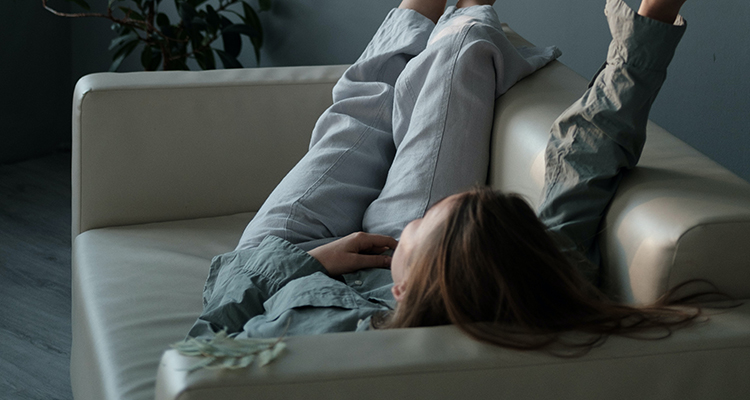
Adopt a Healthy Nighttime Routine
As humans, we thrive on routine. We like to know what to expect. A regular schedule helps us feel in control and purposeful. Creating a healthy sleep routine can do wonders for not only your sleep but also your stress and anxiety levels during PMS.
Perform a relaxing nightly ritual that helps calm your mind and reduce stress. Perform a quiet meditation or mindfulness exercise. Try writing in a journal, repeating positive affirmations, or sipping on a hot cup of tea. Whatever speaks to you.
It’s also important to try and go to sleep and wake up at the same time each day. This helps support a healthy circadian rhythm and naturally triggers both your mind and body when it’s time for sleep.
Embrace Change and a Quality Night’s Sleep
There are certain things in life you can’t change and for many women, that means getting their periods and battling PMS. While some symptoms are mild, others are severe and last for weeks at a time. From mood swings and anxiety to painful cramps, bloating, and food cravings, it can be difficult to navigate this hormonal roller coaster.
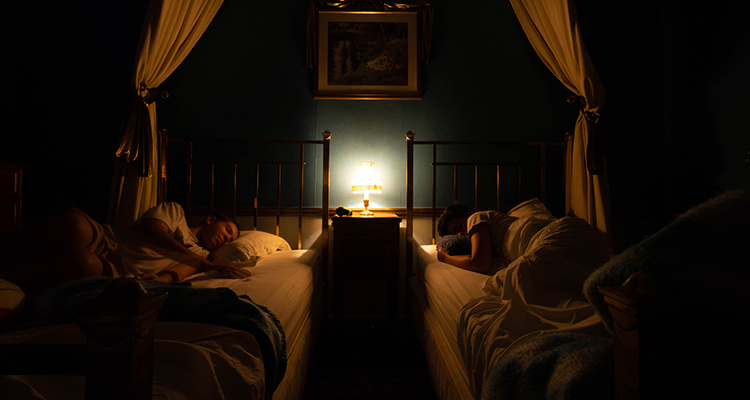
Sadly, PMS can also cause insomnia. The relationship between PMS and insomnia is complicated. PMS can cause insomnia, but finding ways to improve your sleep quality can actually counteract both the emotional and physical side effects of PMS.
And that’s where we come in. Somnus Therapy is designed to help you treat insomnia at home using a combination of proven CBT methods and years of experience and expertise. Through awareness and acceptance, we help patients identify, understand, and accept their sleep troubles. By using a variety of approaches and therapy methods, we find the right treatment program for your individual needs.















